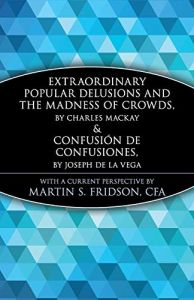Join getAbstract to access the summary!

Join getAbstract to access the summary!
Charles Mackay and Joseph de la Vega
Extraordinary Popular Delusions and the Madness of Crowds & Confusión de Confusiones
Wiley, 1995
What's inside?
When it comes to stock market investing, there’s nothing new under the sun.
Recommendation
Even though these two treatises on investor behavior, options trading, derivatives and stock scams debuted in the 17th and 19th centuries they are still valid today. In 1841, journalist Charles Mackay chronicled the frenzy of historical investment crazes like the “South-Sea Bubble” and “tulipomania.” Change the company names to dot-coms and mortgage-backed securities, and you’ll see that human behavior in markets follows immutable patterns. In 1688, businessman Joseph de la Vega recounted the machinations, conspiracies and outright frauds of the Amsterdam stock trading market. getAbstract recommends these two classics of investing and crowd psychology to anyone who’s ever bought or sold a security. If you think you’ve come up with a never-seen-before financial product, innovative investment strategy or surefire way to beat the market, think again. Savor these venerable financial war stories for everything you need to know about markets and investing.
Summary
About the Authors
Charles Mackay (1814-1889) was a Scottish journalist, poet and songwriter. Amsterdam merchant Joseph de la Vega – who lived in the 1600s – was a Sephardic Jewish émigré.


















Comment on this summary